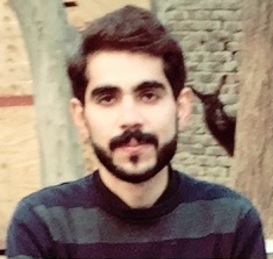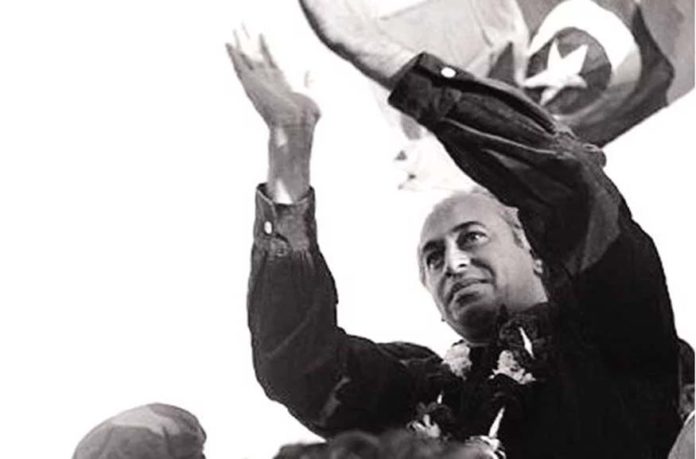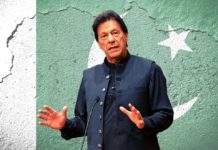Disclaimer: The Eqbal Ahmad Centre for Public Education (EACPE) encourages critical and independent thinking and believes in a free expression of one’s opinion. However, the views expressed in contributed articles are solely those of their respective authors and do not necessarily reflect the position or policy of the EACPE.
Khursheed Kamal Aziz in The Murder of History has considered in detail the distortion of history. Aziz’s artistic piece of work also reveals how Zulfiqar Ali Bhutto becomes the victim of this distortion. The man who preferred death over surrender is one of the most misinterpreted and misconceived people who has been understood by separating him from prevailing (national and international) realities and context. It does not mean that one is entitled not to criticize him but the criticisms must be made after building ‘causal relationship’ between the challenges of the time which he faced and his response to these challenges. If a study which is based on the later part of the last sentence, from ‘but’ onward, then, surely, the study would be an objective one.
Bhutto was hanged because the rule of the then Martial Law Administrator (General Zia-ul-Haq) was at stake is one of the common man’s arguments, which is partially true. The broader picture of this judicial murder unveils an entirely different tale. Bhutto, the prophet of socialism in Pakistan, challenged the economic interests of international capitalists and it was in no way digestible for them. Despite the fact that he belonged to an elite camp, he spoke for the cause of ‘have-nots’ thus his slogan of roti, kapra aur makaan (bread, cloth and home) was chanted in every nook and corner of the country. His drive against capitalists side by side his socialist ambitions became the reason for his demise. Thus Cold War context must not be overlooked while making criticism on Bhutto.
Antonio Gramsci, an Italian Marxist, in The Prison Notebooks suggests that working class can develop into a hegemonic one only when it will take into account the interest of other classes and find ways for the combination of all these interests. He recommends that all working classes must come to the terms of compromise. Interpretation of the role of Bhutto in the light of Gramsci’s teachings reveals what he did was right in that context. As Gramsci asks for the unification of working classes after making compromises among them, Bhutto emerged under these circumstances to fill the vacuum of leadership, when working classes found no other man of words, and he took the reins of leadership in his hands and unified all the classes under him. What if he was from among the elites, the way he dared to deliver was absolutely different from those of his counterparts. Bhutto’s character assassination on the basis of his belonging to so-called elite camp hence proved baseless and fictitious.
The country that Bhutto had inherited was not only demoralized in wake of consequences of war but also had the shivered economy.
History is filled with evidences that progressive compromises and evolution has always brought the long lasting changes. About what Bhutto was ambitious was speeding up this process of evolution by making different compromises. As Bhutto declared Ahmedis as non-Muslims and Friday as holiday, some minds declare him one of the drivers of Islamization. Also, some opinions are circulating hither and thither that he made compromise just in order to secure and prolong his rule. If he was so mean, then why he did not made any compromise on his death-bed when he was offered safe-haven? If he was so religious, why did he pronounce, on his last night, that he do not want to die like a ‘bloody mullah’ while asking for his shaving kit? These examples depict that the compromises he made during the days in power were solely for some causes.
Right after inception, the vicious policies of state set the grounds for debacle of Dhaka. It was not the night long process as it is usually perceived. When the result of General Elections of 1970 was proclaimed, Bhutto emerged triumphant in West while Sheikh Mujibur Rahman in East Pakistan. The later had the clear majority, but transfer of power to Mujib never happened, and in turn, the long resentment of Bengalis compelled them to seek secession in 1971. Those who are unaware of the context consider Bhutto the one and only person responsible for this separation. They should revisit the history to come to the point that neither in 1970 nor in 1971 Bhutto had the de jure power. History will draw their attention towards establishment which never wanted the transfer of power in favor of East Pakistan. Thus blaming Bhutto solely for this separation is based on propaganda by establishment and stands unjust.
The country that Bhutto had inherited was not only demoralized in wake of consequences of war but also had the shivered economy.
It has been argued by some that Bhutto had not fulfilled his promises and played only with the emotions of people. The country that Bhutto had inherited was not only demoralized in wake of consequences of war but also had the shivered economy. The folks expected high from Bhutto while his political rivals tried to derail all his initiatives in right direction. Bhutto was well aware of the grievances of masses and better knew that only evolution will bring change. Thus the argument that has been surfaced so far that he did not change the fate of masses is based on mere wishful thinking. Not radical but evolutionary changes can guarantee the bright future, on which Bhutto tried to set the country but impediments at such an early stage kicked Bhutto’s ambitions out of race. War-torn economy, bringing military to its deserved place in hierarchy, provision of roti, kapra aur makaan to masses, tackling mullahs, countering Indian threat from East and international proxy war for global hegemony were the challenges that Bhutto was supposed to win in very few years till 1977. Rational mind will conclude that the redressal of these ills was possible only through slow and gradual process. Criticizing Bhutto in such scenario reveals lack of understanding.
Once the game is over, an Italian proverb says, the king and the pawn go back in the same box. Pakistan is still in process of evolution. A time will definitely come when the politics of the ‘left’ will strengthen its roots, once and for all. Both the king (capitalists) and the pawns (servants of capitalists) will be dealt with iron hand and no space they will get again to lift their heads up. Hope for the best!
About the Author:

Haider Nisar Sawati is M.Phil student in National Institute of Pakistan Studies (NIPS), Quaid-e-Azam University (QAU), Islamabad. He also serves as Assistant Editor for Gandhara Journal of Research in Social Sciences (GJRSS).
He can be accessed at haider.n911@gmail.com








